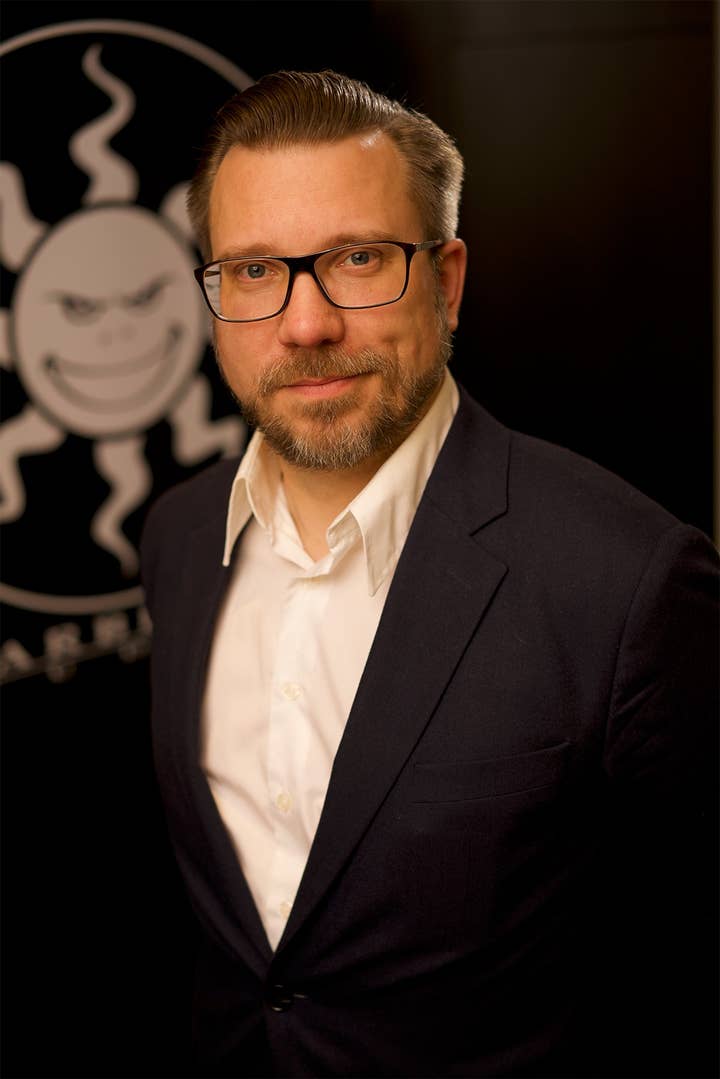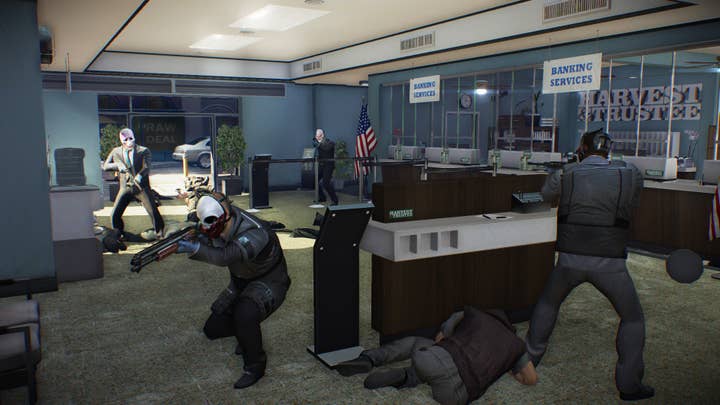Starbreeze 4.0: How the Payday studio escaped the brink of insolvency
CEO Tobias Sjögren on the Swedish developers plans for the future, including Payday 3 and beyond
Like many a Payday 2 player, Starbreeze Studios has made an impressive escape -- not from virtual law enforcement as part of a video game heist, but from one of the lowest financial positions a business can be in without collapsing completely.
Following the poor performance of Overkill's The Walking Dead, a title the Swedish developer had invested heavily in, the company found itself facing insolvency by the end of 2018.
Starbreeze was granted a period of reconstruction -- a measure in Sweden to give businesses the chance to course correct and ensure they are on the path to recovery -- and after multiple extensions, it emerged in December 2019 with a plan to pay off its debts and promises of a new Payday on the horizon.
By the end of 2020, the studio had paid off most of its creditors and in March it secured a €50 million publishing deal for Payday 3 with Koch Media. Understandably, new CEO Tobias Sjögren is feeling optimistic about the company's prospects.

"We're now what's called a 'going concern'," he tells GamesIndustry.biz. "That means we can keep running this business as is, with the cashflow and the money we have in the bank. So we've come from a quite terrible place to this point now where the company is newly focused on the Payday IP and creating games again. It's a stable and healthy company now."
'New' is perhaps not quite the right term to describe Sjögren position at the head of the once-beleaguered company -- he has, in fact, been in the role since October 2020 when Mikael Nermark left for personal reasons. The company searched for a replacement, with Sjögren taking on Nermark's duties on an interim basis before he was offered the permanent role back in March.
When Sjögren joined Starbreeze's board of directors in mid-2019 -- around halfway through reconstruction -- taking over the company "was certainly not in [his] books," he says. Instead, he wanted to take the opportunity to help a notable Swedish games firm get back on its feet. He admits he had not been following Starbreeze's decline closely prior to joining, but believes he understands where previous management ran into trouble.
"Whatever company you're running, you need to make sure you're able to focus on the stuff you set out to do," he says. "If you spread yourself too thin, if you're taking on projects that are too ambitious, you might end up in problems. Anyone could, and from my understanding, that's what happened to Starbreeze."
He adds: "I can't imagine how difficult it was for my predecessor handling this and I'm very grateful for all the work people who have been at Starbreeze over the last couple of years have put in. I'm getting in when we're on the upwards spiral, and it's fantastic."
"We're certainly a very different company compared to what it was before the reconstruction... it feels like a startup"
Indeed, Starbreeze had been spreading itself rather thin. Between 2014 and 2017, the company branched beyond development into publishing, acquired multiple studios around the world, and announced plans to develop its own virtual reality headset.
Reconstruction saw the company dramatically streamline its operations. It sold off studios such as Dhruva Interactive, cancelled the console ports of The Walking Dead, sold assets held by Smilegate to 505 Games parent Digital Bros, sold the publishing rights to titles such as 10 Crowns and System Shock 3, and at one point laid off a quarter of its staff.
What remains is a business solely focused (at present) on the Payday IP, continuing to expand Payday 2, building up to Payday 3, and reviving efforts on a mobile spin-off. While it's a much slimmer operation, it does perhaps have fewer tools in its belt when it comes to reclaiming past growth, although Sjögren says he doesn't "feel like [Starbreeze is] missing anything."
"I couldn't ask for a better starting point than that," he says. "We jokingly say we're Starbreeze 4.0 now, considering how long Starbreeze has been around. We're certainly a very different company compared to what it was before the reconstruction. That's partly in terms of people, especially the management team.
"We have some awesome people who have been with the Payday IP throughout its lifecycle who are still with us, but it feels like a new company, a startup, and we're really keen on getting [back on top]. And when we look at how Payday 2 is performing and how many people play it on a daily basis, I think we're already there."

The turning point has been the revival of Payday 2. First released in 2013, the multiplayer heist shooter was not exactly launched as the typical games-as-a-service offering we often see today. But in October 2019, Starbreeze revealed it was once again working on expansion content and paid DLC -- and this has been critical to the company's recovery.
The game is currently on a cycle of four DLC expansions per year, with each year's content linked together by an ongoing storyline. "Call it a season, perhaps," says Sjögren in reference to the model employed by the likes of Fortnite, Apex Legends and Call of Duty Warzone. While these four are all premium purchases, there have been regular updates and smaller content additions rolled out to all users for free.
"We're not going to stop with Payday 3. There will be more games - exactly what and when, that's not been decided yet"
"That has worked really well for us," says Sjögren. "Before coronavirus really hit, we were already seeing a great uptake in player numbers for Payday 2 and it's been really encouraging to see the game performing better than in many, many years. Over the last year we've done numbers that rival the first couple of years of the game, which is fantastic."
The renewed efforts to build up the game has also grown its audience globally, with Sjögren noting that both playtime and purchases are "more equally spread" across different markets -- and this has in turn influenced Starbreeze's approach to growing its games in future.
"We need to be -- and it's kind of a buzzword -- but we need to be 'glocal,'" says Sjögren. "Because the content you need to do needs to be available everywhere and should be relevant wherever you're based. But then you also need to have a community service you feel is local and close, and understands your needs and your questions. That's really the challenge for the business today, be global but at the same time service a local community."
With Payday 2 keeping the company afloat, much of its attention is now on Payday 3 -- the prospect of which was key to convincing the Swedish courts that Starbreeze could avoid insolvency. But while the studio's financials look increasingly promising with each quarter, it's hard not to see the forthcoming shooter as a make-or-break moment for Starbreeze.
"In simplicity, that's, of course, correct," Sjögren admits. "But we are very certain about our abilities so we're not going to stop with Payday 3. There will certainly be more games coming from our company -- exactly what and when, that's not been decided yet."
And just as Payday 2 has adapted to appeal to gamers accustomed to service-driven titles, so Payday 3 is being built with more longevity in mind than its predecessor. The game is not due to launch until 2023 -- "That time is what you need to make a game good," says Sjögren of the long wait. The developers have already planned "way beyond launch" in terms of updates and how to keep the community engaged.

"The whole trend in the industry now is that you don't necessarily release another box in two to three years -- it used to be before Christmas every year -- but rather deliver to customers and enhance their experience in the game where you already have them," says Sjögren. "And that makes total sense, especially with digital distribution -- it's a much better way of doing business and servicing your customers.
"Obviously Payday 3 is going to be [ongoing]... We're good at managing a community and building a game that can be monetised over time"
"Obviously Payday 3 is going to be [ongoing] and that plays into one of our key strengths at Starbreeze. We're good at managing a community and building a game that can be monetised over time. I definitely think Payday 3 will stay true to that part of the experience, but also it needs to change with the times and we have a lot of insights and understanding of what we need to do to be relevant when we release this, ten years after Payday 2."
For all its talk of transformation, Starbreeze 4.0 is very much like its earliest incarnations: focusing on developing core titles for console and PC. Gone (for now, at least) are the virtual reality and publishing ambitions, with the team instead focused on games-as-a-service, initially around a single -- and thankfully lucrative -- IP.
And it seems to be paying off. Shortly after we spoke to Sjögren, Starbreeze released its financial results for the first quarter of 2021, showing losses had shrunk to just over $505,000 -- the lowest quarterly loss in many years, and the second sub-million loss (having posted $985,000 in Q3 2020).
There's still a way to go before the company is back in the black. While Sjögren refrains from offering a forecast of when this might happen, he observes that there are still debts left to be paid in Starbreeze's post-reconstruction plan, adding: "There are write-offs that we'll have to live off that will hurt our financial results, but from a cashflow perspective, we're in a very good position."
Nonetheless, Sjögren already has his eye on new horizons, even beyond games, as the company regains momentum.
"Right now we're doing premium games with premium DLC, but that definitely might change in future," he says. "We aim to create content that works in whatever way we want to monetise in future, that the content will be relevant to a particular audience. You can do that with a lot of different IPs, so we want to have a mix and we want a mix that can broaden outside and beyond games.
"Our focus is always going to be on games but we want to find partnerships where our IP can meet a broader audience. That's also something we're seeing industry-wide now, with games properties moving into film and TV."

